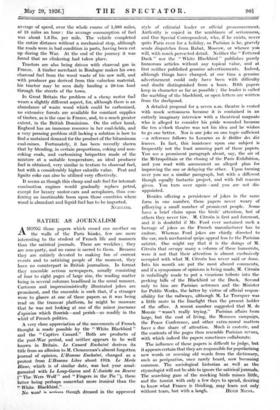SATIRE AS JOURNALISM A MONG those papers which crowd one another
on the walls of the Paris kiosks, few are more interesting to the student of French life and manners than the satirical journals. These are weeklies ; they are non-party, and no cause is sacred to them. Because they are entirely devoted to making fun of current events and to satirizing people of the moment, they have no counterpart in British journalism. In format they resemble serious newspapers, usually consisting of four to eight pages of large size, the reading matter being in several columns headlined in the usual manner. Cartoons and impressionistically illustrated jokes are prominent, and the ensemble is such that, if a stranger were to glance at one of these .papers as it was being read on the tramcar platform, he might be unaware that he was not looking at one of the minor journaux d'opinion which flourish—and perish—so readily in the whirl of French .polities.
A very close appreciation of the movements of French thought is made possible by the " White Blackbird " and the " Captive Canard." Both are products of the post-War period, and neither appears to be well known in Britain. Le Canard Enchaine derives its title from an allusion to M. Clemenceau's almost forgotten, journal of opinion, L'Homme Enchains, changed as a protest from L'Homme Libre about 1919. Le Merle Blanc, which is of similar date, was last year amal- gamated with Le Loup-Garou and L'Assiette au Beurre (" The Were Wolf " and " Fingers in the Pie "), these latter being perhaps somewhat more ironical than the " White Blackbird."
No word is AtIlIS though dressed in the approved style of editorial leader or official pronouncement. Authority is copied in the semblance of seriousness, and Our Special Correspondent, who, if he exists, never quits Paris even for a holiday, so Parisian is he, gravely sends dispatches from Rabat, Moscow, or whence you will, with much perverted detail. Neither the " Fettered Duck " nor the " White Blackbird " publishes purely humorous articles without any topical value, and at first neither published genuine advertisements. Indeed, although things have changed, at one time a genuine advertisement could only have been with difficulty and doubt distinguished from a hoax. Both papers keep in character as far as possible ; the leader is called the warbling of the blackbird, or open letters are written from the duckpond.
A detailed proposal for a seven a.m. theatre is vested with mock seriousness because it is contained in an entirely imaginary interview with a theatrical magnate who is alleged to consider his pride wounded because the ten o'clock theatre was not his idea and he wishes to go one better. Nor is one joke on one topic sufficient —a reference follows to Locarno as le thed,tre des dix leurres. In fact, this insistence upon one subject is frequently not the least amusing part of these papers. You see a prominent paragraph about, say, the air of the Maropolitain or the closing of the Paris Exhibition, and you read with amusement an alleged plan for improving the one or delaying the other. Upon turning over you see a similar paragraph, but with a different though equally fantastic project, and with full reasons given. You turn over again—and you are not dis- appointed.
Besides offering a persistence of jokes in the same form in one number, these papers never weary of pillorying a small number of prominent people. Some have a brief claim upon the birds' attention, but of others they never tire. M. Citroen is first and foremost, and it is doubtful if Mr. Ford ever sustained such a barrage of jokes as the French manufacturer has to endure. Whereas Ford jokes are chiefly directed to the car, such mechanical quips appeal less to the Parisian satirist. One might say that it is the doings of M. Citroen that occupy many a column of these humorists, were it not that their attention is almost exclusively occupied with what M. Citroen has never said or done. Into his mouth are put the most absurd comments, and if a symposium of opinions is being made, M. Citroen is unfailingly made to put a vicarious tribute into the pecking bills of the Blackbird or the Duck. Second only to him are Parisian actresses and the Minister for Public Works, the latter by virtue of official respon- sibility for the railways, although M. Le Trocquer was a little more in the limelight than the present holder of the office. A recent number suggested that M. de Monzie " wasn't really trying." Parisian affairs loom large, but the cost of living, the Morocco campaign. the Peace Conference, and other extra-mural matters have a due share of attention. Much is esoteric, and the contents of the pages thus resemble Parisian revues, with which indeed the papers sometimes collaborate.
The influence of these papers is difficult to judge, but it appears certain that they are responsible for popularizing new words or rescuing old words from the dictionary, such as perequation, once rarely heard, now becoming common. The sociological historian as well as the etymologist will not be able to ignore the satirical journals. The searching gaze of the mocking birds misses little, and the tourist with only a few days to spend, desiring to know what France is thinking, may learn not only without tears, but with a laugh. Huon










































 Previous page
Previous page